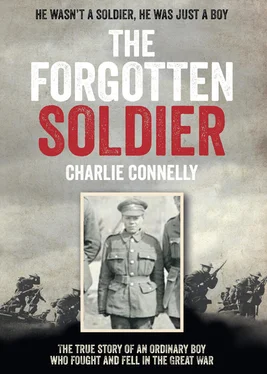The following day’s battle brought a bloody end to the reign of the Plantagenets in England, and when news filtered back from the fight that his father had been killed, the younger Richard immediately made himself scarce. He fled to London and commenced an apprenticeship as a stonemason, a trade he would continue for the rest of his life.
In 1540 Sir Thomas Moyle employed an elderly mason in the building of his home and estate at Eastwell Place, a man who would stay working on the project for a full ten years until his death. Moyle noticed that the older man stayed aloof from the rest of the builders and masons, and he became, from a distance, fascinated by this enigmatic, faintly melancholy old workman. It was some time in the mid-1540s, when Moyle noticed the mason reading a text in Latin – most unusual for a labouring man – that he engaged him in conversation and eventually coaxed Richard’s story out of him. On hearing of Richard’s royal connections Moyle allowed this last of the Plantagenets to build himself a small cottage on the estate in which to live out his final years. He was buried on the estate and the tomb where I’d parked my rear end is his reputed last resting place.
It’s a terrific story and one that I find myself hoping to be true. But as I looked at the tomb in what would have once been the nave of the church, I was well aware that wishing something to be true doesn’t make it so. I thought about Richard and I thought about Catigern of Kit’s Coty, both victims in different ways of wars and battles, and both possibly nothing like the men of their respective legends. These mythologies made me think about Edward: in a way I was mythologising him by trying to recreate his story and fashion his personality. Through the character traits and personal attributes I was attaching to him every time I imagined his experiences, I was creating a myth. The sketchy account of the basic movements of his regiment in the 10th Queen’s Royal West Surreys’ war diary provided the only clues I had to where he was and what he was doing in his final months, and even that was vague. I had no idea where Edward had been or what he was doing, and certainly I had no idea about who he actually was. Most disappointingly of all, I had no idea how, where or why he died. Was he single-handedly charging a machine-gun post and saving countless lives in exchange for his own? Was he taken out by an artillery shell while advancing across no man’s land? Did he absent-mindedly stick his head above the trench parapet just as a sniper fixed him in his sights? Was his death heroic, tragic or even comic? At the back of my mind I was even starting to wonder whether the decades of silence that followed his end had something to do with the nature of his death. Could he, I wondered, even have been one of the 300 or so British soldiers court-martialled and shot by their own side? Hero, traitor, coward or deserter, I reminded myself that I might never know for certain the truth behind Edward’s final days and death. Despite this resignation I still had to be careful not to create a mythology that might be at best misleading and at worst a gross distortion of the truth, even though I might never learn what the truth actually was.
I heaved my rucksack onto my back and set off again, passing Sir Thomas Moyle’s old Eastwell Manor, now inevitably a hotel and conference centre, and walked up the hill towards the village green of Boughton Aluph.
7
‘In the event of my death …’
Basic training for new recruits took place in Britain, either at an established camp like Aldershot or Shorncliffe, near Folkestone, or one of the many new camps that sprang up as the war progressed. Initially, the emphasis was on getting the recruits fit, teaching them about their equipment and how to use it, and instilling discipline. For most of the new lads this was a completely alien way of life: the endless drills, the constant cleaning and polishing of equipment, how to salute a superior officer correctly, how to dig a trench and the route marches of up to twenty-five miles with a fully equipped pack. They were given a number, a haircut and a uniform, as the army set about stripping them of as much of their individuality as it took to make them into fighting and killing machines.
On arrival there was another, more rigorous medical for which the men had to strip naked and wait in line to see the doctor, who would prod every limb, check the pulse, examine the teeth and test eyesight and hearing.
The new recruit was then given his basic kit: two tunics, two pairs of trousers, an overcoat, a cap, a pair of boots, three pairs of socks, two pairs of underwear, three shirts, a set of cutlery, a mess tin, a razor, toothbrush, shaving brush, shoe brush and a needle and cotton. With the kit the quartermaster handed the new man some string and brown paper: civilian clothes, the last link to a previous life, were to be wrapped up and sent home.
One of the positive aspects of camp life was the three meals a day, something men from poorer backgrounds would not have been used to. Breakfast consisted of bacon with kippers or a slice of bread and a mug of tea. Lunch was pie, stew or boiled beef and potatoes, while at tea time you were provided with bread and jam and more tea. The helpings were not enormous, and with all the relentless physical exercise the younger recruits were often hungry, meaning they were thankful for the recreation huts set up by churches and voluntary organisations where the lads could go to sit in the evening with a cup of tea and a bun.
George Fortune was sent initially to Hounslow Barracks with the Royal Fusiliers but then moved on to Aldershot with the Middlesex Regiment, where he was soon given a taste of what military life had in store.
‘When we arrived at Aldershot we had to parade at the gym for a lecture from the adjutant,’ said George. ‘He was a little man, I think he was Jewish, name was Lewis. He jumped up on the platform and shouted, “I’ll break your hearts!” Someone wrote to John Bull about him and in the article he was referred to as the Khaki Heartbreaker.’
In order to build up fitness, George and his colleagues were marched constantly around the square in all weathers in a training regime that bordered on the brutal: ‘They would have us up at five in the morning, shaking blankets out on the square, then for the rest of the day they drilled the life out of us. Our hands used to be at our sides. The weather was freezing and I got bad chilblains: my hands were like sausages and the chilblains were broken too. Waiting for pay outside our barracks one day Sergeant Watts – he was a real snaggle-toothed bastard – came up to me, barked, “Take your hands out of your pockets,” and slashed at them with his cane. I was a bit slow getting them out as they were so sore. When I hadn’t whipped them out as quickly as he’d liked, he asked me my name and told me to fall in once I’d got my pay. When I went to see him he made me clean metal washbasins with sand. The water was ice cold and the sand got into my broken chilblains, and since 1919 I’ve been looking for that bastard. It’s not too late to kill him.’
William Dann’s experience of his basic training was altogether less unpleasant. After enlisting, he was billeted at home for six weeks and drilled at Preston Park in Brighton before being sent to Canterbury where he was transferred to the 10th Queen’s as an infantryman.
‘The training I thoroughly enjoyed,’ he said. ‘It was so exciting with plenty of interesting things to do. The discipline was a bit tight, but you could take it – that’s what you went in for. After a while at Canterbury we were transferred to Colchester Barracks, which was an infantry barracks. The officer shouted at parade one morning, “All men under nineteen remain and the rest dismiss.” They gave us all a form and a railway warrant home to get our parents’ permission to go to France, even though we were still under nineteen. I went back to Brighton and my father and I had a chat. He asked me if I wanted to go and I said, “Well, I’ve been with these chaps a long time and I know them. If I don’t go I’ll have to make new friends, so I think I’d rather go.”’
Читать дальше












